Abstract
.png?Expires=1769177119&Key-Pair-Id=K2V2TN6YBJQHTG&Signature=TkmFo31tRYRnLYnhkv8kor-umpESIA8yu89qYnBtq~dI1a~OayfJ2Hn8vyzn~iT4blxZR6xGZ6sTmlqi7~GaJc~fNOmRqBT~Uu0UTDYvxp4dX3XReQX~pnpptb4ntuhx43HAqnbV6wDW-ThDIMcaw7H83ftB2WXfUtxAR8j7RxifOjFdP9KdS8z7JCa4RWORnVBjnqDq3MQ6ln~iZ~4GosNKoXM9oPBHmZmG~iMAiZuAE~6DvVF~X4uaIKNIPcY4MYkdRgarqk2oRb9th-ZwYkPo2mwxmVwZxFWxjR-rm5IMtJXjKgEnrIDOvToN4NBvpF11N7HfXUiQaL3IeMZbMA__)
Programmed from my college dorm, FRIDAY is a groundbreaking offline voice assistant designed to redefine personal AI interaction. Unlike traditional voice assistants that rely on cloud-based APIs, FRIDAY operates entirely locally, ensuring privacy, speed, and cost efficiency. Moreover, as an open-source project, FRIDAY invites developers and enthusiasts to collaborate, improve, and customize the assistant for their unique needs.
Powered by technologies like Ollama, Llama 3.2, and Gemma2, FRIDAY provides instant responses, adapts to user preferences, and operates without the need for an internet connection. Its open-source nature means that anyone can contribute to its development, ensuring that it evolves continuously in line with community feedback. With features like Spotify integration, weather updates, and smart reminders, FRIDAY represents a step toward a future where AI is not only private, fast, and accessible to everyone but also open for all to improve.
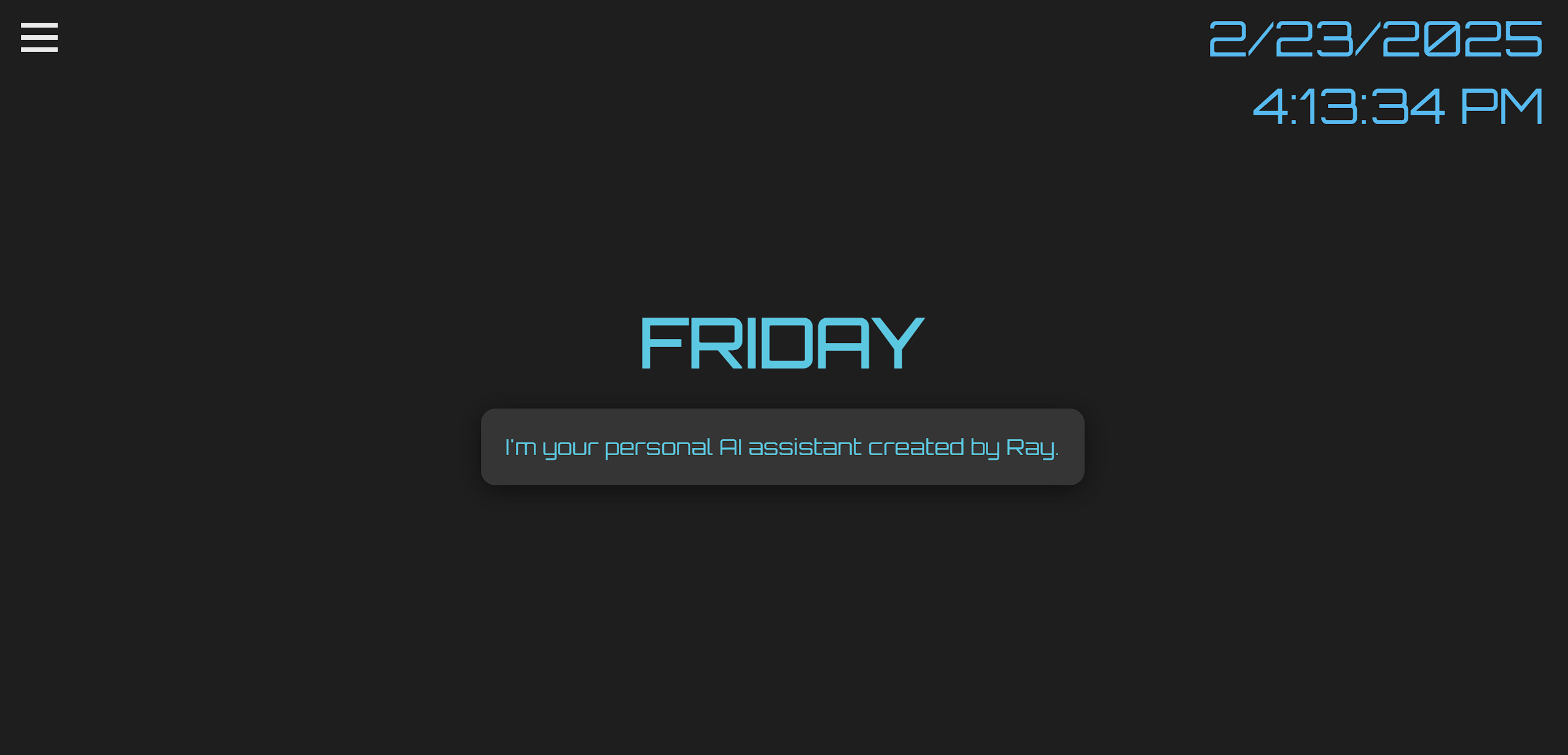
GitHub - Friday Offline Voice Assistant
Email - Raypoulton11@yahoo.com
Phone - 443-896-4231
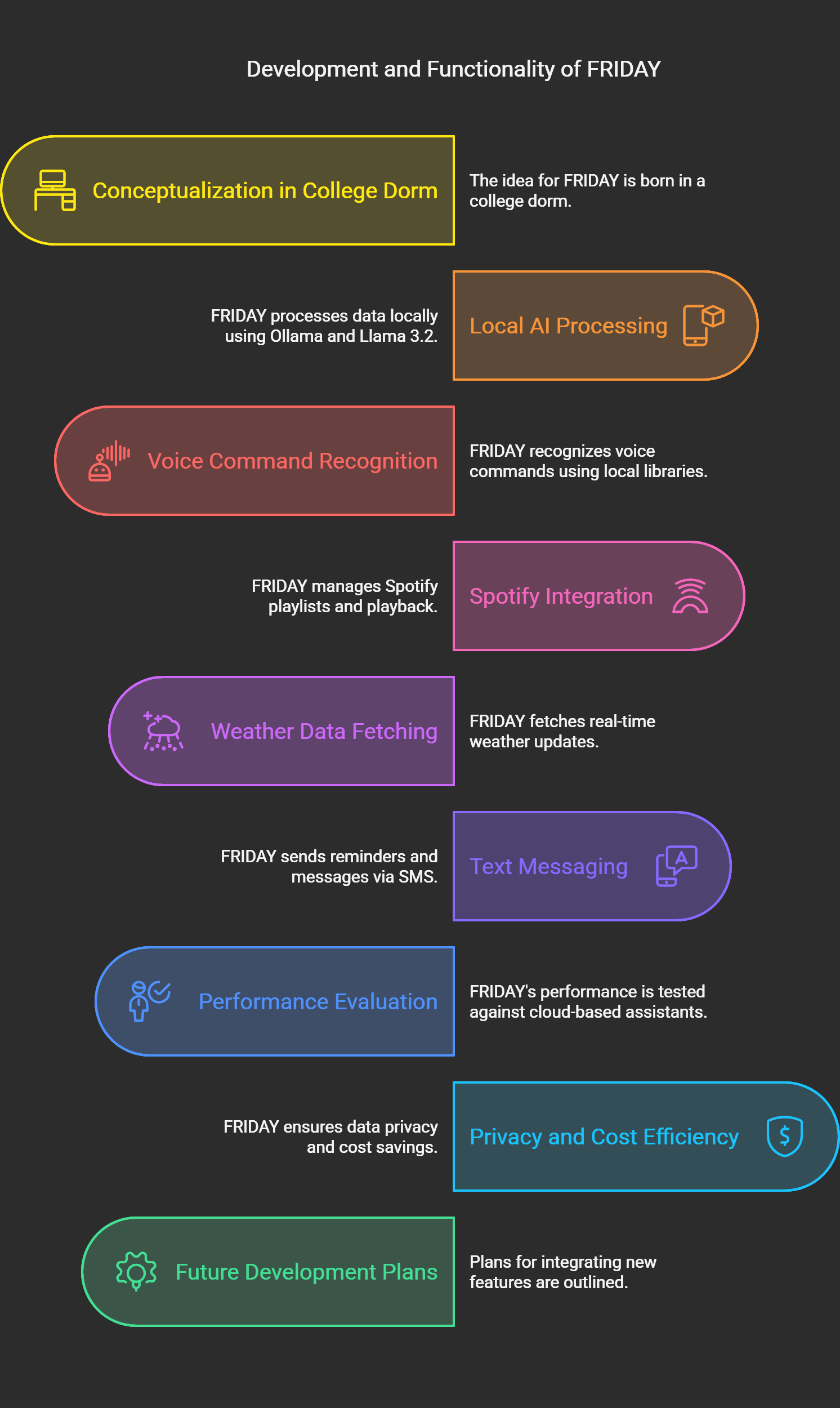
Introduction
Voice assistants have become integral to modern life, but they come with significant limitations, such as reliance on cloud services, privacy concerns, and recurring costs. FRIDAY addresses these challenges by offering a fully offline, local AI solution that not only keeps your data private but also ensures faster, more reliable interactions. Unlike most voice assistants that depend on cloud-based APIs, FRIDAY is designed to operate entirely locally, providing a secure, cost-effective, and lightning-fast AI experience.
Built as an evolution of existing voice assistants, FRIDAY leverages cutting-edge technologies like Ollama, Llama 3.2, and Gemma2 to deliver a personalized and efficient user experience. Additionally, as an open-source project, FRIDAY invites contributions from developers and AI enthusiasts around the world, enabling the community to improve, expand, and shape its future. This makes FRIDAY not just a tool, but a platform for innovation, where everyone can be part of its growth.
This publication documents the development, features, and innovations behind FRIDAY, showcasing its potential to revolutionize the voice assistant landscape. With a focus on privacy, speed, cost efficiency, and open-source collaboration, FRIDAY is leading the charge towards a new era of AI interaction.
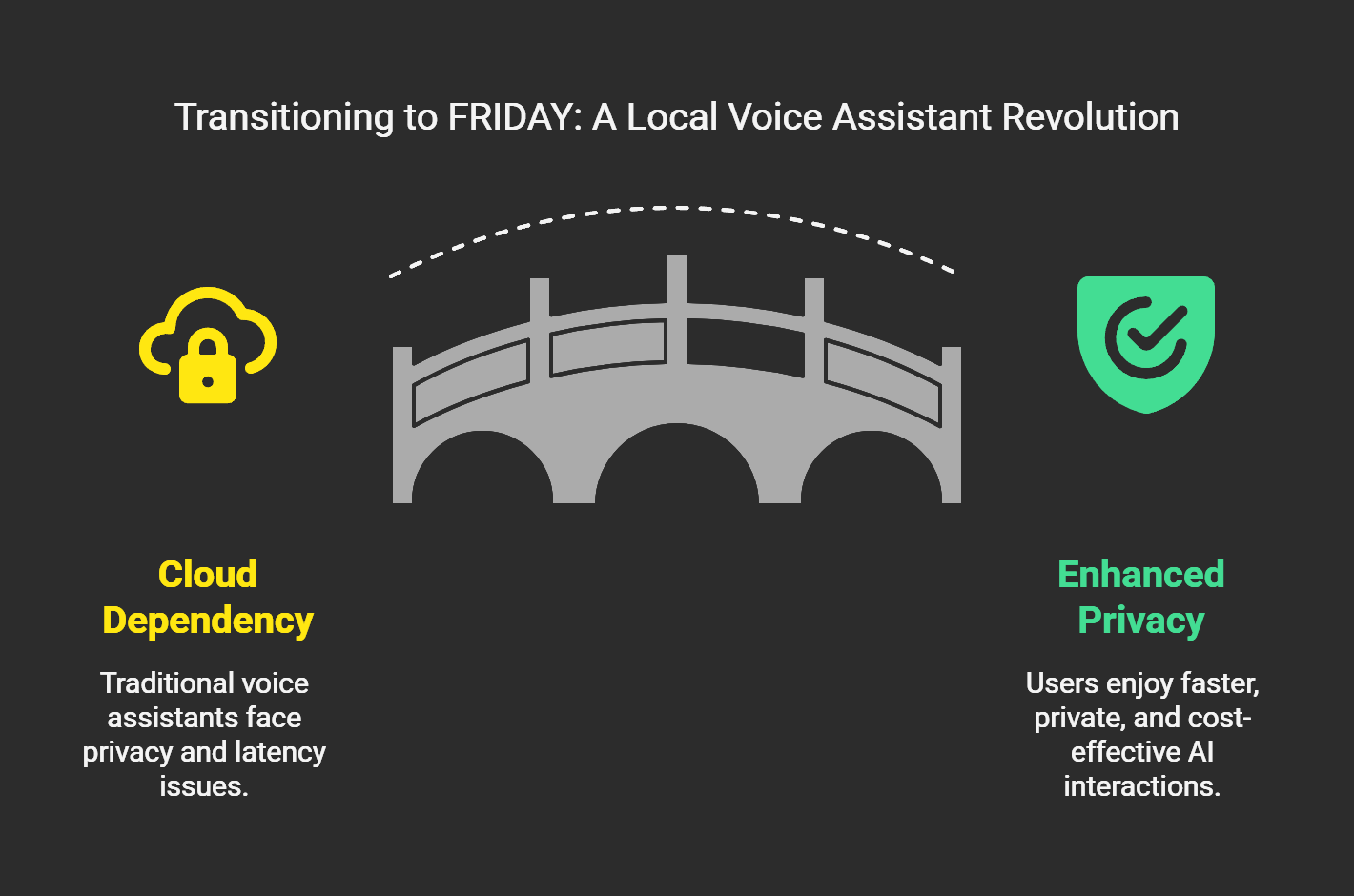
Related work
Traditional voice assistants like Siri, Alexa, and Google Assistant have become ubiquitous, but they rely on cloud-based APIs for processing. This reliance introduces several significant challenges, including latency, privacy risks, and a constant dependency on internet connectivity. Users' data is processed and stored remotely, creating concerns about data security and privacy.
Recent advancements in local AI models such as Llama 3.2, and Gemma2 have opened up new possibilities for creating offline AI solutions. These models enable voice assistants to operate entirely on the user's device, without relying on cloud servers, solving many of the privacy and latency issues inherent in traditional systems.
FRIDAY builds on these advancements by combining the power of local processing with user-friendly features. The result is an AI assistant that not only responds instantly but also ensures that all data is processed locally, providing a more secure and responsive user experience. As an open-source project, FRIDAY also allows the community to contribute, improve, and shape its development, making it a truly collaborative effort that stands out from the closed, proprietary systems used by traditional voice assistants.
By moving away from cloud dependence and embracing local AI models, FRIDAY offers a unique solution that prioritizes privacy, speed, and customizability—features that are often overlooked in traditional voice assistants. This open-source approach fosters continuous innovation, allowing FRIDAY to grow and evolve with contributions from a global community of developers and users.
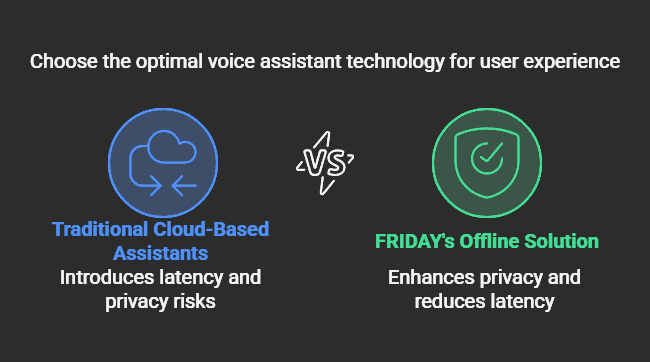
Methodology
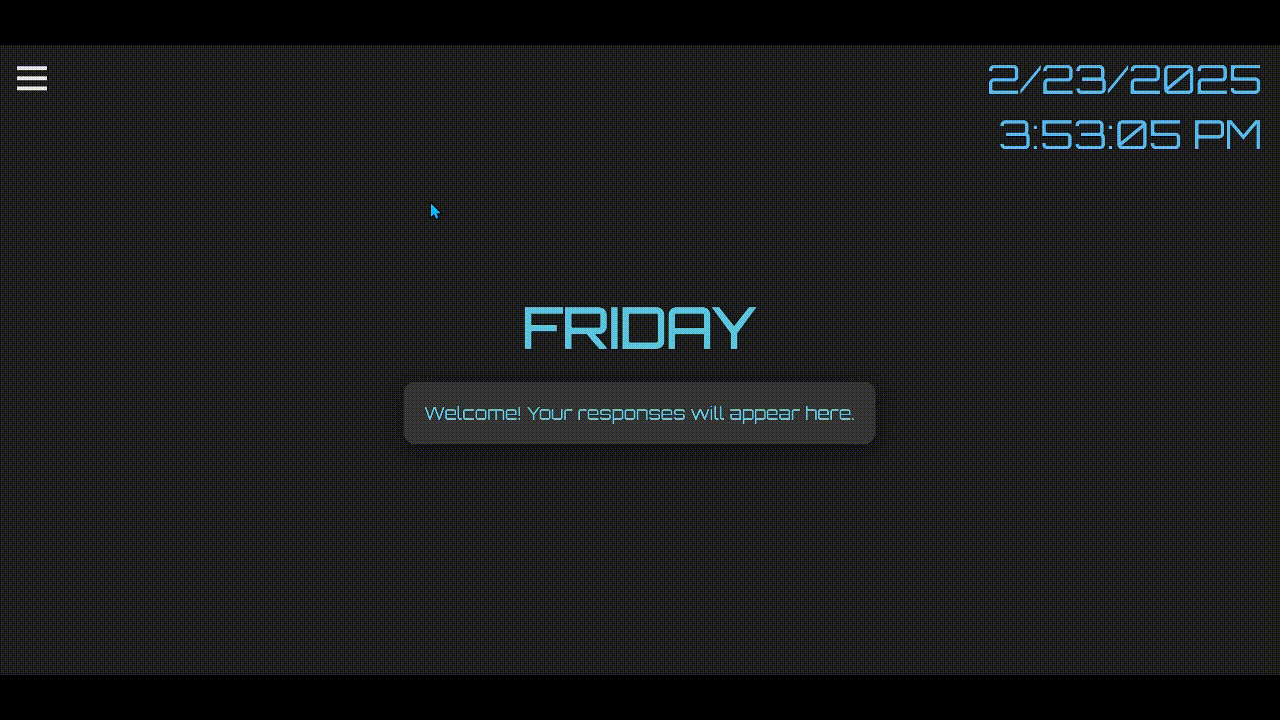
- Local AI Processing:
-
Utilizes Ollama and Llama 3.2 or Gemma2 for offline AI processing.
-
Ensures privacy by keeping all data on the user’s device.
- Voice Command Recognition:
- Implements local speech-to-text and text-to-speech libraries for seamless interaction.
- Spotify:
- Enables song playback and playlist management when connected to Wi-Fi.
- Weather Data:
- Fetches real-time weather updates from the National Weather Service.
- Text Messaging:
- Sends reminders and messages via local SMS integration.
- User Interface:
- Features a clean, intuitive interface for easy interaction.
- As an open-source project, the UI is fully customizable, allowing contributors to suggest improvements or redesigns based on feedback from the community.

Experiments
To evaluate FRIDAY's performance, I conducted a series of experiments designed to test its speed, offline functionality, and overall user experience. These experiments were crucial in assessing how FRIDAY compares to traditional cloud-based voice assistants, as well as its ability to function efficiently without an internet connection.
The first area of focus was speed comparison. To assess the speed of FRIDAY’s responses, I compared its online response times with those of cloud-based assistants, such as OpenAI-powered services. By running identical queries on both systems, I found that FRIDAY’s local processing delivered responses much faster, thanks to the elimination of server latency typically introduced by cloud-based systems. This local processing resulted in a much more instantaneous user experience, with the speed difference being particularly noticeable in tasks requiring real-time interaction.
In terms of hardware compatibility, I discovered that Llama 3.2 struggled to perform optimally on lower-end hardware, which could lead to delays and performance issues on less powerful devices. To address this, FRIDAY now includes Gemma2, a version of the AI designed to work efficiently on lower-end hardware. Gemma2 has been successfully tested on a wide range of devices, from high-performance computers worth
Finally, I tested offline functionality, which is one of the primary goals of FRIDAY. I executed a variety of tasks without an internet connection, including setting reminders, writing short papers, answering general knowledge questions, and performing basic calculations. In all cases, FRIDAY successfully completed the tasks, demonstrating its robustness and reliability in offline environments. This offline capability is one of FRIDAY’s key advantages, allowing users to rely on the assistant even in areas with limited or no internet connectivity.
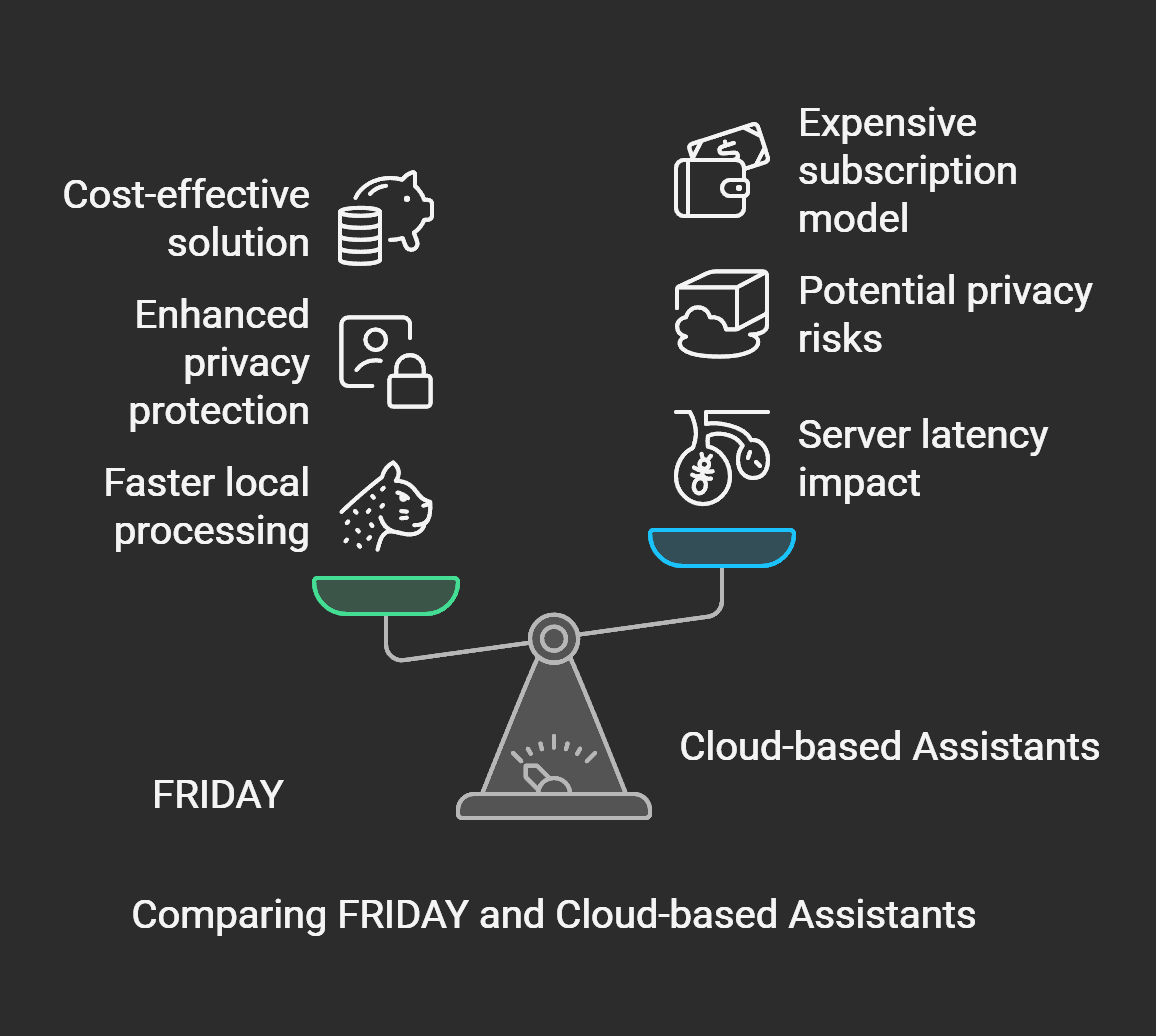
Results
The experiments yielded promising results, showcasing FRIDAY’s potential as a next-generation voice assistant. In terms of speed, FRIDAY’s local processing capabilities ensured near-instant responses, outperforming cloud-based solutions that often suffer from network latency. This speed advantage was particularly noticeable in tasks requiring real-time interaction, such as setting reminders or answering queries. In direct comparison, FRIDAY’s offline speed is now faster than the most advanced AI assistants like Alexa and Siri by at least 2 seconds, significantly enhancing the user experience.
Privacy was another major win for FRIDAY. By keeping all data on the user’s device, FRIDAY eliminated the privacy risks associated with cloud-based processing. Many users will appreciate the peace of mind that comes with knowing their personal data is not being sent to external servers or stored in the cloud, making FRIDAY a highly secure and private solution. As an open-source project, FRIDAY allows users and developers to inspect and ensure that data privacy is maintained, offering transparency and control.
Cost efficiency was also a significant benefit. Unlike traditional voice assistants, which rely on expensive API subscriptions for cloud processing, FRIDAY operates entirely offline and is completely free to use. This makes FRIDAY accessible to a wider audience, including those who may not want to invest in premium voice assistant services or who need a more affordable solution for personal or low-resource devices. The open-source nature of FRIDAY also means that users can contribute to its development, improving its functionality without incurring additional costs.
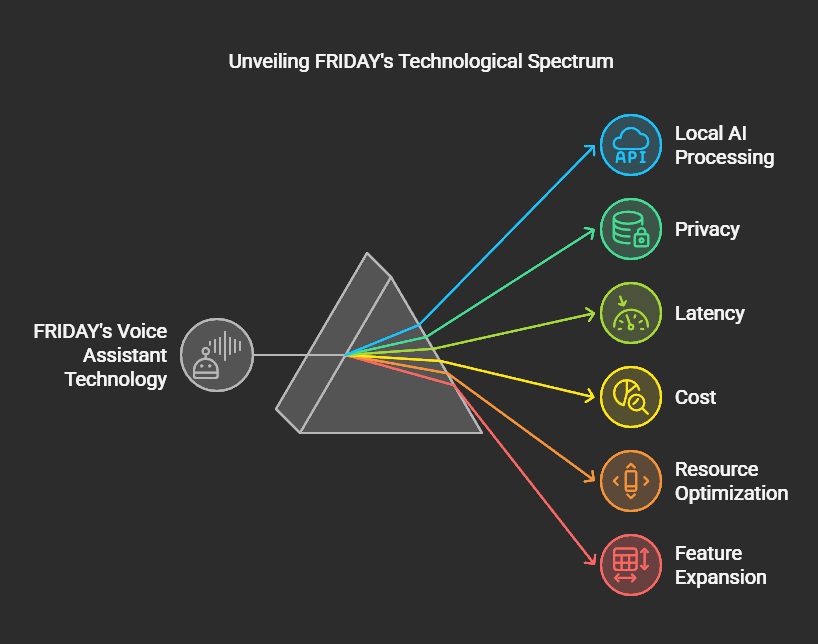
Discussion
FRIDAY represents a significant step forward in voice assistant technology. By leveraging local AI processing, it effectively addresses critical issues like privacy, latency, and cost that are commonly associated with cloud-based assistants. The ability to process all data locally ensures that users' privacy is protected, while the offline functionality eliminates the need for an internet connection, providing faster responses and greater control over data. However, despite these advancements, challenges remain, particularly in expanding FRIDAY’s feature set. Future development will focus on enhancing its capabilities by integrating AI vision, enabling image and video generation, and adding alarm clock functionality to make FRIDAY even more versatile. These updates will allow FRIDAY to offer a more comprehensive AI experience and bring it closer to fulfilling its potential as a truly all-encompassing personal assistant.
Conclusion
FRIDAY is more than just a voice assistant—it represents a vision for the future of AI. By combining local processing with user-centric features, FRIDAY offers a faster, more private, and cost-effective alternative to traditional voice assistants. Its offline capabilities ensure that users are not reliant on an internet connection, while its open-source nature encourages community involvement and continuous improvement. As an innovative step forward in voice assistant technology, FRIDAY is positioned to redefine the way users interact with AI. I invite the AI community to explore FRIDAY’s potential, contribute to its ongoing development, and help shape the future of personal AI.
References
Ollama
Llama 3.2
Gemma2
National Weather Service
OpenAI Whisper
The Open Source Community
Acknowledgements
I would like to thank the open-source community for their contributions to local AI technologies. As well as the developers of Ollama, Whisper, Llama 3.2, and Gemma2 for making this project possible.
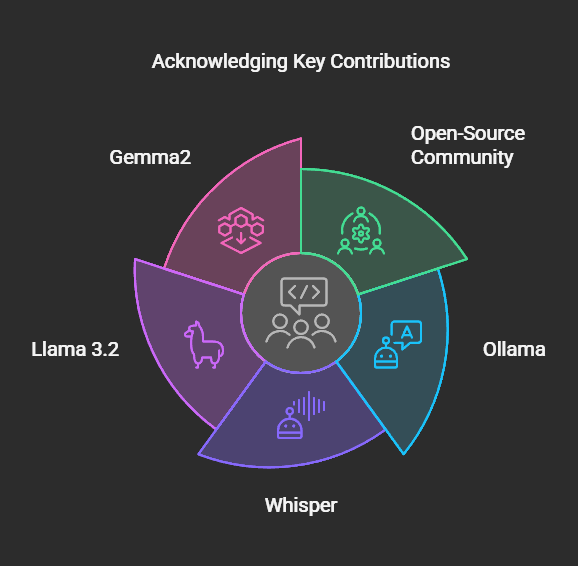
Appendix
Code Snippets
-
Install Ollama from their website
-
Setting Up Ollama:
For High Performance Hardware:
bash-
ollama run llama3.2
ollama serve
OR
For all hardware compatibility:
bash-
ollama run gemma2
ollama serve
- Installing Required Libraries:
bash-
pip install -r requirements.txt
Running FRIDAY:
-
Fork code from
GitHub - Friday AI Voice Assistant -
Please note that accounts will need to be setup for Spotify Developer, for any Spotify - related functions.
Additionally, a Gmail account will need to be setup for your assistant to be able to send text messages.
For any comments or concerns:
Email: Raypoulton11@yahoo.com
Phone: 443-896-4231